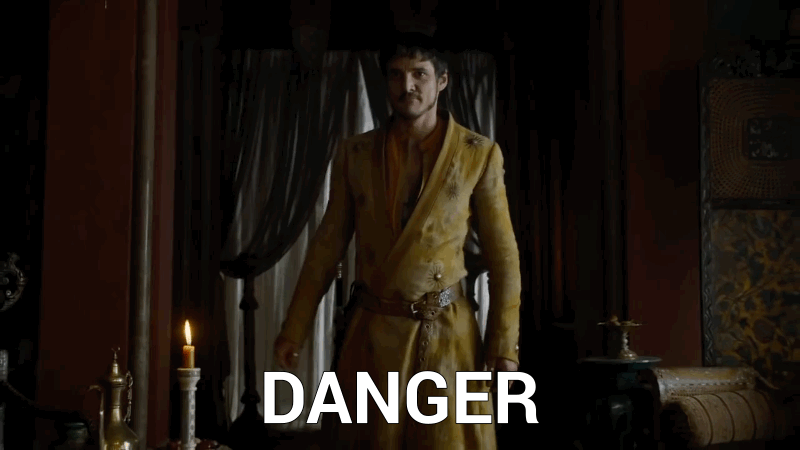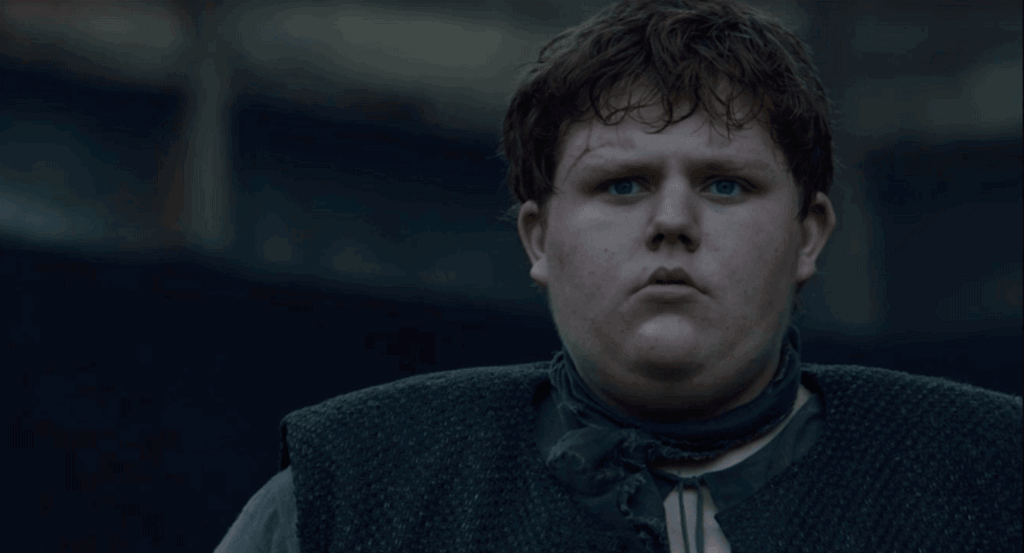Game of Thrones Explained: Hold The Door, Answers Are Trying to Break Through
In its most tragic moment yet, season 6 finally answered some big questions about the future.
It’s okay that it hurts. That’s actually the point. As they mentioned in the “Inside the Episode” segment after season 6, episode 5, this kind of thing hurts show creators David Benioff and Dan Weiss, too. In the past, they’ve sat in hotel rooms with George R.R. Martin learning integral plot points to be revealed in future books – like the big one delivered in this week’s episode – and it hurts.
If the emotional weight (and time-bending plot device) of an episode like “The Door” feels familiar, that’s on purpose. For this and the next episode, Game of Thrones has turned to former Lost director Jack Bender. He’s the guy who delivered “The Constant” for Lost, an episode that revolved around Desmond, Penny, and their time-transcendent romance. That’s what Jack Bender does best: he finds the heart and soul of an episode, the emotional core driven by characters, all while bending time. This episode of Thrones needed that kind of steady hand and that’s exactly what he gave it.
Now that we’re half way through season 6, it’s clear that the show is ready to answer a number of big questions – for show watchers, book readers, and every fan at any level of engagement. This episode may not seem like it moved a lot of the plot forward, but it played around with some foundational building blocks that will inform what is to come next.
Following a little spoiler warning – what follows will include book knowledge, speculation, and all kinds of crazy talk – we’ll discuss a few instances in which the show has tipped its hand.

What did Bran just do?
Ever since the Three-Eyed Raven began lecturing Bran about not staying connected to the trees for too long, lest he drown under the sea, it was clear that Bran would somehow screw this all up. The Weirwood.net connection was too provocative a drug, too intense a high, to be ignored by the eager Stark tween. What we learned from this episode’s massive, hulking final action set piece is that Bran’s connection to the past is about more than seeing his dad when he was a strapping youngster. And he’s not the only one who is connected to the natural neural network. With one touch of the arm, The Night’s King was able to find Bran and break through the barrier set up by the Three-Eyed Raven’s magic. That which protected Bran and company at the end of season 4 was gone in an instant and all of the sudden, we’ve got a cave full of deadites and another damn dire wolf is dead.
This alludes to Bran’s place in this greater story and perhaps the method by which the White Walkers might make their passage south of The Wall. George R.R. Martin’s books tell us that this magic – the kind that keeps White Walkers out of caves – is elsewhere in the world. Namely, there’s magic in The Wall, which was built a long time ago by another Brandon Stark (Bran The Builder). As Martin once explained, “more than ice went into the raising of the Wall. Remember, these are fantasy novels.”
Throughout the books, there are plenty of examples of how Bran The Builder influenced the building of impenetrable fortresses meant to keep the people of Westeros safe. This includes Winterfell and Storm’s End, the seat of House Baratheon. If you’re looking for a wonderful longform explanation of all these magical barriers, read this piece by Joanna Robinson at Vanity Fair. It’s very comprehensive.
The TL;DR version: the reason the White Walkers haven’t attacked The Wall yet is because there’s some magical element to it, just like the cave. We have to wonder, then, if Bran is the key to all of The Night’s King’s plans. Perhaps he’s already broken the spell that will allow the White Walkers to pass The Wall. Perhaps he has the power to do so in the future. It’s clear that the Three-Eyed Raven and The Night’s King have been locked in battle for a while, with the former doing his best to keep the latter away from humanity. Now that the Three-Eyed Raven is gone, it’s up to Bran. And as this episode tells us in no uncertain terms: he’s not ready.

We also learn that Bran’s interactions with the past, via Weirwood.net, are more than Read Only. This was hinted at in the Tower of Joy sequence earlier in the season, when Bran watched Ned Stark and Howland Reed defeat Ser Arthur Dayne in their quest to reclaim Lyanna Stark. In that moment, it was a lost son trying to reach out to a version of his father. In this episode, it was a desperate move that had tragic consequences. The mystery of why Hodor always said “Hodor” was revealed, and with it came the ten-thousand pound weight of knowing that it was Bran who was ultimately responsible. It’s a closed loop, the story of Hodor. The words that turned him into the gentle, protective, simple man were the same words that would lead to his final act of heroism. His loss is a reminder of what makes Game of Thrones both tragic and satisfying. He was a character that existed in the background, mostly as a fun diversion in Bran’s otherwise bland early series storyline. In death, he becomes a heroic and tragic figure. Some might say that he deserved better than to be taken out by an army of White Walkers, but this episode suggests that helping Bran escape was exactly what Hodor was destined to do.
Is this a power that Bran will use again? Might he be less reckless the next time he plugs into The Matrix? Time will tell. But now, at the very least, he knows the cost.
Is Sansa playing the game, or still Littlefinger’s pawn?
While Bran’s power and its many revelations is the dominant magical theme of season six, the dominant political theme is all about the ascendence of the Women of Westeros and Essos. Between Sansa, Yara, Daenerys, Brienne, Cersei, and the women of Dorne, it appears as if the Patriarchy is in a lot of trouble this year. While the first five seasons (and books) were spent making kings disappear, this sixth season has seen a number of queens rising to power. This episode continues that in many ways, but we’re starting to see things get twisted in complex and unsettling ways. We’re starting to see that even though the women of Westeros are on the rise, their male counterparts are still pulling a lot of the strings.
Sansa’s story is perhaps the most evident of this thematic muckery. In her interaction with Littlefinger, we see her asserting herself in a new way. She spends a great deal of the conversation giving Littlefinger the blow by blow of how big a mistake he made by handing her over to the Boltons. It sets up a choice: does she have Brienne slice him up for mockingbird stew, or does she forgive him and accept his help (help that she and Jon desperately need right now)? Sansa splits the difference, ultimately telling him to hit the bricks. It’s a fascinating sequence that can be interpreted a number of ways. Sansa didn’t make the emotional choice, nor did she make the right strategic choice. To compound things, she later lied to Jon about how she knew about The Blackfish. It seems like the kind of deliberate thing a storyteller might do to indicate that Sansa is still caught up in Littlefinger’s web, whether she knows it or not. She’s doing the one thing that Littlefinger would never do: let emotion get in the way of an opportunity.
It’s possible that this opens the door for Littlefinger to make a heroic gesture, bringing in The Knights of The Vale at the last moment to assist the Starks in their impending battle with Ramsay. The question is: do we think Littlefinger is genuinely sorry? If so, Sansa’s calculated move is spot on. If not, she might be in trouble again. Either way, Littlefinger is affecting her decision making.
Elsewhere, we see a gentle subversion of this feminism rising theme. In the Iron Islands, the Kingsmoot is all but sealed for Yara before her Uncle Euron shows up and does his swarthy pirate routine. After a few jabs at Theon’s lost manhood and Yara’s girl-ness, Euron is elected by an overwhelming majority of bearded seamen. This is a show that isn’t afraid to poke holes in its glass ceiling, but it isn’t ready to bust that thing up just yet.
In Meereen, during a scene in which we’re again reminded of all the mutilation that has befallen some of the men of this story, we see Tyrion and Varys scheming to make the people of Meereen believe that their plan is the work of Daenerys. While the ascendent queen (whose hair braid-work is next level) marches back toward Slaver’s Bay with her new horde, there are men pulling the political strings in her name.
We even see a little bit of this in the scene with Arya. Remember Arya? She was in this episode, I swear. When she is given a name by Jaqen, we are meant to think that she’s really making it at Assassin Camp. Perhaps we are almost free of all these training montages. But even that triumphant moment is cut down a bit as she watches the mummers’ reenactment of the end of season one. Arya’s joy – be it from getting her assignment or seeing faux Cersei get smacked around a bit – is cut down by the characterization of Ned Stark and his demise, a moment for which she had a front row seat. It was the moment that sent her down the dark path she now walks, a painful reminder that she’s still Arya Stark.
Does this mean that season six’s Rise of the Queens is doomed to fail? Certainly not. It’s just a reminder that nothing in Westeros is ever that simple. As I explored last week, Daenerys could very well be one of the villains of this story. For those hoping that Game of Thrones will take a thematic road toward subverting the patriarchal dominance that exists in almost every other fantasy story (myself included), I say keep the hope alive, but be vigilant. There are no guarantees that your favorite queen, or your favorite Hodor, are going to make it out of this tale alive.
This week in fun hashtags…
We are the Tormund and Brienne Shippers of Westeros. The official hashtags of our movement are #Tarthbane and #Tormundorable. Join us.
Next Week…
A few quick predictions based on the Season 6, Episode 6 preview:
- There’s an immediacy to what happens with Bran and Meera next. Will they get away from the army that is still on their heels? And will there be some sort of further intervention by magical forces? Book readers know what I’m talking about. If there were ever a great time for Coldhands, this would be it.
- We get to meet Sam’s dad! I’m sure he’s a peach.
- Will this be the High Sparrow’s day of reckoning?
- Daenerys seems pretty confident.
